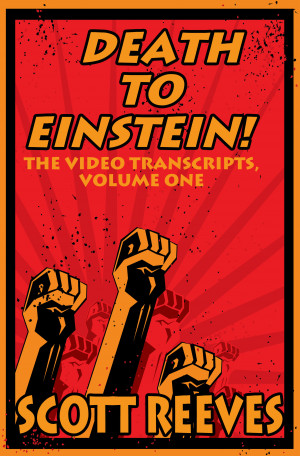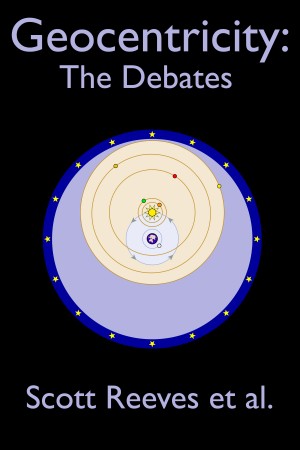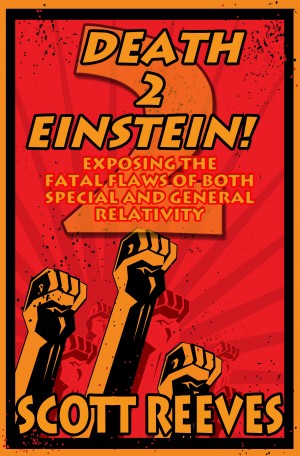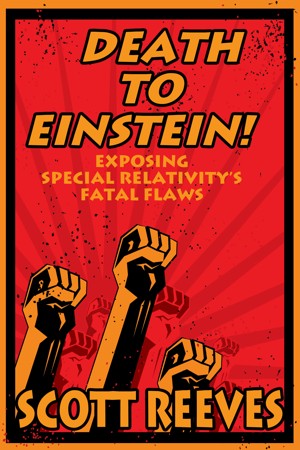Interview with Scott Reeves
Published 2013-09-04.
What motivated you to become an indie author?
I like to say that I was indie when indie wasn't cool. Back in the late 90's, I made a few half-hearted attempts to get published with one of the traditional publishing companies. But most of my books are shorter than what they wanted (mine average around 50k words, and most publishers want at least 70k, it seems), and anyway, I only submitted a grand total of three of my novels. All three were rejected with form letters.
The form letters really pissed me off. Not because of the rejection, but because of the impersonal nature of it. But I understood that the sheer volume of submissions made personal replies impractical. Basically those form rejection letters were the biggest indication that there was no point in even bothering with traditional publishers. If they had so many submissions that they couldn't take the time to give me an even slightly personal response, then I figured the odds against being traditionally published must be astronomical.
Actually, about the only encouragement I ever got was from Dean Wesley Smith. I submitted some short stories to Weird Tales and the Strange New Worlds anthology, both of which he was editor. He rejected everything, but did so with a few personalized, encouraging words. I always remember those rejections, even if he probably doesn't even remember me or my submissions, because I was glad someone had at least taken the time to give me a personal response.
See, it was never the rejection that bothered me. Someone could have told me my story completely sucked big hairy balls, and it wouldn't have bothered me. At least they would have taken the time to tell me my story sucked big hairy balls. That's better than a form letter that lists a whole host of possible reasons the story or novel might have been rejected, and lets you pick whichever reason you like.
Anyway, back to the question. I only submitted a few of my novels. The rest I published myself through iUniverse, way back in the late 90's and early 00's, when POD was in its infancy and iUniverse wasn't a part of AuthorHouse and was actually a reputable POD publisher. I never did actual vanity presses, because I knew they were a scam. But when iUniverse started out, they only charged a $99 setup fee, which included a cover designed from your own idea. The price seemed completely reasonable for a service that was the same as what Createspace and LightningSource offer today. So despite all the controversy around iUniverse today among indie authors, pre-AuthorHouse iUniverse was basically a Createspace clone (or rather, Createspace is basically a pre-AuthorHouse iUniverse clone), and I have fond memories of it.
I never liked the idea of one person at a publishing company, or a handful of people at publishing company, deciding whether my writing would ever reach an audience. What made these few people so freaking special that they had the power to withhold my writing from other people who might want to read it?
I set up a website in the late 90's where I ranted against the publishing establishment. This was in the days when it was considered shameful in most circles to be a self-publisher, and so my rants fell on deaf ears. But I was always proud of my independence, and these days, it annoys me a little that suddenly everyone is saying what I've been saying all along: down with the gatekeepers! But it's nice to see that the world has now finally come around to my viewpoint. I've ALWAYS been self-published, and proud of it, even when self-publishers (indies) were spat upon by both readers and other writers. I was fighting the good fight long before Joe Konrath ever came along.
But to answer the original question directly: what motivated me to become an indie author? My rebellious nature. The complete freedom to write whatever I feel like writing, without having to consult with some stupid editor at a big publishing house. Rebelliousness and creative freedom, that's what motivated me.
What are you working on next?
Multiple projects. I've got so many books I want to write, I have trouble deciding which to work on next. But right now I'm working on Zombie Galaxy 2, and Apocalyptus Interruptus. Those are two I'm actually in the process of writing. But I've got about half a dozen other ideas that are percolating at the back of my mind, which is part of my writing process.
Who are your favorite authors?
Robert Jordan. Jack Vance. David Zindell. Anne Tyler.
When you're not writing, how do you spend your time?
I'm almost never not writing. Even when I'm not sitting at the computer, typing into the word processor, there is always some writing-related idea stewing in the back of my mind. There's something Terry Brooks said in his writing book, which was something like, "I'm not really here," or "I'm only half here." Meaning that half his mind was always in one of his writing worlds, whatever he was doing at the time. That's how I am. I'm always mentally dwelling on something creative, whether it's writing related or not. No matter what I'm doing, I'm always distracted by writing or creative thoughts, so that I'm only half present in whatever non-creative activity I happen to be doing.
But when I'm not actually typing a novel into Word, I go to movies. I read a lot. Watch TV. Have massive amounts of sex (in my dreams). I've got a 60-acre, heavily-wooded "farm" that I spend a lot of time on, tramping through the woods, hacking back the woods that keep trying to reclaim the areas that I've "civilized," things like that.
What is your writing process?
Usually an idea for a plot or a setting comes to me, and then the thing percolates in my mind, always in the background, until suddenly, almost fully formed, a beginning, a middle and an end oozes to the front of my mind, and I begin writing. I never start writing until I have at least those three things, and usually I have a lot more, with scenes that bridge the beginning, the middle and the end. And I usually write several pages of notes before I begin. Not all at once, and not in any sort of coherent outline. Just mainly plot elements and bits of dialogue, and reasons why particular scenes have to happen and in what order. I never just sit down and start writing by the seat of my pants. Usually the idea is pretty well fleshed out, a lot in my mind and a lot on paper (or actually, Word document) before I ever begin setting down the actual prose that appears in the final book. And I never rewrite. The standard mantra in the writing world seems to be “Rewrite, rewrite, rewrite,” but I’ve never rewritten anything. Any book of mine that you buy in the store is pretty much the book exactly as it came out of my mind the first time. I write one sentence at a time, and don’t really advance to the next sentence until I’m satisfied with the one I’ve just written. I don’t just sit down and write in a frenzy, with the intention of coming back and cleaning up later. I don't overwrite and have to cut things out, and I very rarely go back and add things in afterward. I’m very deliberate. I go in with a pretty rigid knowledge of the direction I’m going with the story, and lay down one sentence at a time without advancing until I’m mostly happy with it. So I just slog along from the first sentence until the last, and once I finish the last sentence, I just go on to the next idea without looking back.
I don’t write for a set amount of hours each day, and sometimes I’ll go for months without writing anything “real,” except for book notes on “percolating” projects, and personal diary entries. Stuff that will never see the light of day. I’ll go for months, sometimes as long as a year, without writing anything “real,” and then one day I’ll just sit down and start plodding along through a novel or a short story. Usually a novel. Then I’ll write for an hour or so each day, for a month or three, and at the end I’ll have a novel. Then when that’s done, I’ll immediately start work on another, repeating the process, or I will have “burned out” and will take a few months, half a year, off, while I recuperate. It sounds like a pretty slow pace and maybe not very productive, but in the seventeen or so years I’ve considered my writing more than a hobby, I’ve managed to churn out about one novel a year. In that same time, I’ve also managed to write and illustrate two graphic novels, and animated a 25-minute cartoon. So I don’t think it’s a slow method. It’s what works for me.
What are your five favorite books, and why?
My five favorite books are actually non-fiction. In no particular order:
Tertium Organum, by P.D. Ouspensky, because it has some really insightful ideas about time and reality.
An Experiment With Time, by J.W. Dunne, because it has some really insightful ideas about time and reality.
Living Time, by Maurice Nicoll, because it has some really insightful ideas about time and reality.
Space and Time, by Barry Dainton, because it gives the best summation of numerous ideas about time and reality.
Galileo Was Wrong, the Church Was Right, by Robert Sungenis, because it's a courageous and devastating debunking of the most widely (and incorrectly) held idea about Man's place in the universe. (Yes, I am one of those nuts who actually believes that the Earth is literally motionless at the center of the universe, with the universe rotating around the Earth).
What do you read for pleasure?
Science fiction and fantasy, and popular non-fiction science books. Also the occasional physics textbook.
When did you first start writing?
I wrote my first story in second grade, in 1976. After that, I wrote short stories off and on up until about 1994, when I kicked things into high gear and knew that writing was more than just a hobby for me.
Do you remember the first story you ever wrote?
I not only remember it, I still have it. I wrote it as an assignment in second grade. It's an illustrated story about five pages long, hand-written in very big letters with crayon drawings. It's about a living planet that suddenly vanishes and finds itself in "grape" space. Soon to be a major motion picture.
How do you get past writers block or distractions like the internet?
I’m not even sure what writer’s block is. Is that when you can’t think of anything to write? I don’t think I’ll ever NOT be able to write something. I’ve got more ideas for books and stories than I’ll be able to write in my lifetime, and if I ever get “stuck” on a detail in a novel, I’ll just work on something else until the kink works itself out. For me, there’s no such thing as writer’s block. If anything, I get “motivational” block, where I can’t seem to force myself to sit down and write, because it seems pointless. Honestly, a lot of times, I view writing as something akin to masturbation. This is why I’ll sometimes take months and months off from writing anything. I get burned out, and view writing as pointless and masturbatory, and am a bit repelled by it, and don’t think I’ll ever write another word. And then suddenly, one day I’ll just sit back down and crank something else out. Usually when I finish something, I think, “That’s it, this is the last thing I’ll ever write.” But I always end up writing more. When I tell myself I’ll never write another word, I never believe myself any more, because I always say it, and yet I keep cranking them out. I still say it, but I’ve been doing this long enough to realize it’s all just part of my process. I don’t think I will ever stop writing.
Smashwords Interviews are created by the profiled author or publisher.
Books by This Author
Death to Einstein: The Video Transcripts, Volume 1
by Scott Reeves
(5.00 from 1 review)
From the Introduction: "Over the past several years, I have been keeping a video log of my thoughts on Relativity and Geocentricity. They are an elaboration upon ideas presented in my book Death to Einstein! I have now amassed a hundred or more hours of video, and have begun the laborious process of transcribing them. The present volume represents the first such batch of transcripts."
Geocentricity: The Debates
by Scott Reeves
(5.00 from 1 review)
Geocentrism: The belief that Earth is literally motionless at the center of a universe which revolves around it. Believe it or not, in this day and age, there are still people who hold such a belief. But is there any scientific evidence to support this belief, or are these people just a bunch of kooks?
This book consists of a series of debates on this issue.




